- Home
- Georgette Heyer
Death in the Stocks: Merely Murder Page 2
Death in the Stocks: Merely Murder Read online
Page 2
The Inspector set his finger on the electric bell, remarking as he did so: ‘Might be the charwoman’s. Who looks after the garden, and the electric light plant?’
‘Young Beaton, sir. He comes in a couple of days a week. But he wouldn’t bring his dog with him, not into the house. There’s someone here all right. I can hear him moving about.’
The Inspector pressed the bell again, and was about to press it a third time when the door was opened to them by a girl with a head of burnished copper curls, and very large and brilliant dark eyes. She was wearing a man’s dressing-gown of expensive-looking brocade, which was several sizes too large for her, and was chiefly occupied in keeping back a powerful bull-terrier who did not seem to view the visitors with much favour.
‘Shut up you fool!’ commanded the girl. ‘Heel! – What on earth do you want?’ This last remark was addressed in a tone of considerable surprise to the Inspector.
‘Inspector Jerrold, miss, from Hanborough,’ said the Inspector, introducing himself. ‘If convenient, I should like to have a word with you.’
She looked at him frowningly. ‘I don’t know what you want to have a word with me about, but you can come in if you like. Get back, Bill!’
The two men followed her into a square hall, decorated in a modernist style, with curtains and a carpet of cubist design, a number of tubular steel chairs, and a squat table of limed oak. The girl saw Constable Dickenson blink at it and said with a flickering smile: ‘You needn’t think I did it.’ The Constable looked at her rather quickly, involuntarily startled. ‘You’d better come into the kitchen. I haven’t finished breakfast. The scenery’s better too.’ She strolled ahead of them through a door at the end of the hall into a pleasant kitchen with a tiled floor, a homely-looking dresser, and a breakfast of eggs and coffee and toast spread at one end of the large table. An electric cooker stood at one end of the room, and a small electric brazier had been attached by a long flex to the light fixture, and was switched on for the purpose of drying a linen skirt which was hung over a chair-back in front of it. The Inspector, pausing on the threshold, cast a swift, trained glance round the room. His gaze rested for a moment on the damp skirt, and travelled to the girl. She walked round the table, picking up a slice of half-eaten toast and butter from her plate in a casual way as she passed, and pulled a chair forward. ‘Sit down, won’t you? I warn you, I shan’t make any statement till I’ve seen my solicitor.’ She looked up as she spoke, and raised her brows. ‘Joke,’ she explained.
The Inspector smiled politely. ‘Yes, miss, naturally. Might I ask if you are staying here?’
‘God, no!’
The Inspector glanced at the brocade dressing-gown, and looked inquiring.
‘Quite right, I spent the night here,’ said the girl coolly. ‘Anything else you’d like to know?’
‘Did you come down with Mr Vereker, miss?’
‘No, I didn’t. I haven’t seen Mr Vereker.’
‘Indeed, miss? Was he not expecting you?’
A rather hard glint crept into the girl’s fine eyes. ‘Well, everything was very nicely prepared, but I don’t fancy it was on my account. But what the hell it has to do with –’ She broke off, and laughed suddenly. ‘Oh, I see! Sorry to disappoint you, but I’m not a burglar – though I did get in through a window. The dressing-gown is merely borrowed till my skirt’s dry.’
The Inspector directed his gaze towards the skirt. ‘I quite understand, miss. Must have been a bad stain, if I may say so.’
‘Blood,’ said the girl between sips of coffee.
Constable Dickenson gave a slight gasp. ‘Blood?’ said the Inspector evenly.
The girl set down her cup, and met his look with a belligerent gleam in her eyes. ‘Just what do you want with me?’ she demanded.
‘I’d like to know how you came to get blood on your skirt, miss,’ said the Inspector.
‘Yes? Well, I should like to know what right you have to ask me that – or anything else for that matter. Get on with it! What is it you’re after?’
The Inspector drew out his note-book. ‘There’s no need to take offence, miss. We’ve had a little upset in these parts last night, and I have to find out one or two details. May I have your name and address, please?’
‘Why?’ asked the girl.
A shade of severity crept into the Inspector’s voice. ‘You’ll pardon me, miss, but you’re behaving in a silly way. There’s been an accident connected with this house, and it’s my duty to get what information I can about it.’
‘Well, you aren’t likely to get much out of me,’ observed the girl. ‘Don’t know anything. My name’s Antonia Vereker. Address, 3 Grayling Street, Chelsea. What the devil’s the matter now?’
The Inspector had looked up quickly from his notebook. ‘A relation of Mr Arnold Vereker?’ he said.
‘Half-sister.’
The Inspector lowered his gaze to the book again, and carefully wrote down the name and address. ‘And you say you have not seen Mr Vereker since you came here?’
‘Haven’t seen him for months.’
‘How long have you been here, miss?’
‘Since last night. Sevenish.’
‘Did you come especially to see your brother?’
‘Half-brother. Of course I did. But I haven’t seen him. He never turned up.’
‘You were expecting him, then?’
‘Look here!’ said Antonia strongly. ‘Do you think I should have motored thirty-five miles to this place if I hadn’t expected to see him?’
‘No, miss. But you said a minute or two back that Mr Vereker was not expecting you. I was merely wondering how it was that with him not expecting you, and you not having seen him for months, you were sure enough of finding him here to come all that way?’
‘I wasn’t sure. But I know his habits. Coming here over the week-end is one of them.’
‘I take it you wanted to see him urgently, miss?’
‘I wanted to see him, and I still want to see him,’ said Antonia.
‘I’m afraid, miss, that won’t be possible,’ said the Inspector, getting up from his chair.
She stared at him in a smouldering way. ‘Oh, won’t it?’ she said.
‘No, miss. I’m sorry to have to tell you that Mr Vereker has met with an accident.’
Her brows drew together. ‘Are you breaking it to me gently? You needn’t bother. Is he dead, or what?’
The Inspector’s manner became a shade sterner. ‘Yes, miss. He is dead,’ he answered.
‘Good lord!’ said the girl. The fierce look had left her face; she glanced from one to the other of the two men. To the Constable’s shocked amazement, a twinkle appeared in her eye. ‘I thought you were trying to run my dog in,’ she remarked. ‘Sorry I was a trifle brusque. He had a bit of a fight last night, and a dam’ fool of a woman who owned the other dog swore all sorts of vengeance on him. Is my half-brother really dead? What happened to him? Car smash?’
The Inspector had no longer any compunction in disclosing the truth. ‘Mr Vereker was murdered,’ he said bluntly. He noticed with satisfaction that he did seem at last to have startled her a little. She lost some of her colour, and looked as though she did not know what to say. He added after a short pause: ‘His body was discovered in the stocks at Ashleigh Green at one-fifty this morning.’
‘His body was discovered in the stocks?’ repeated the girl. ‘Do you mean somebody put him in the stocks and he died of fright, or exposure, or what?’
‘Your half-brother, miss, died as a result of a knife-thrust through the back,’ said the Inspector.
‘Oh!’ said Antonia. ‘Rather beastly.’
‘Yes,’ said the Inspector.
She stretched out her hand mechanically towards an open box of cigarettes, and began to tap one of them on her thumb-nail. ‘Very nasty,’ she observed. ‘Who did it?’
‘The police have no information on that point at present, miss.’
She struck a match, and lit the cigarette
. ‘Well, I didn’t, if that’s what you want to know. Have you come here to arrest me, or something?’
‘Certainly not, miss. All I wish to do is to make a few inquiries. Anything you can tell me that would throw some light on –’
She shook her head. ‘Sorry, but I can’t. We haven’t been on speaking terms for months.’
‘Excuse me, miss, but if that’s so, how do you come to be in Mr Vereker’s house now?’
‘Oh, that’s easy,’ she replied. ‘He wrote me a letter which made me see red, so I came down to have it out with him.’
‘May I ask if you have that letter, miss?’
‘Yes, but I don’t propose to show it to you, if that’s what you’re after. Purely personal.’
‘I take it the matter was very pressing? Mr Vereker would have been in London again on Monday?’
‘Well, I didn’t feel like waiting till Monday,’ retorted Antonia. ‘He wasn’t in Eaton Place when I rang up, so I took a chance on his being here. He wasn’t, but the beds were made up, and there was some milk and butter and eggs and things in the larder, which made it look fairly certain that he was expected, so I waited for him. When he didn’t turn up at midnight I went to bed, because it seemed to be a bit late to go home again then.’
‘I see. And you haven’t been out of the house since – I think you said it was about seven o’clock – last night?’
‘Yes, of course I’ve been out of the house since then,’ she said impatiently. ‘I took the dog for a run just before I turned in. That’s when he had the fight. A mangy-looking retriever set on him about half a mile from here. Blood and fur all over the place. However, there was no real damage done.’
The Constable was surveying the bull-terrier, lying watchfully by the door. ‘You dog wasn’t hurt then, miss?’ he ventured.
She looked contemptuous. ‘Hardly at all. He’s a bull-terrier.’
‘I was only thinking, miss,’ said the Constable, with a deprecating glance towards the Inspector, ‘that it was odd your dog wasn’t bitten too.’
‘You don’t seem to know much about bull-terriers,’ said Antonia.
‘That’ll do, Dickenson,’ intervened the Inspector. He addressed Antonia again. ‘I shall have to ask you, miss, if you would come back to the Police Station with me. You’ll understand that you being a relative, and in Mr Vereker’s house at the time, the Chief Constable would like to have your statement, and any particulars you can give of the deceased’s –’
‘But I tell you I don’t know anything about it,’ said Antonia snappishly. ‘Moreover, if I’m wanted to make statements and sign things, I’ll have a lawyer down to see I don’t go and incriminate myself.’
The Inspector said in a measured tone. ‘No one wants you to do that, miss. But you must surely realise that the police are bound to want all the information they can get. You can’t object to telling the Chief Constable quite simply anything you know about your brother –’
‘Don’t keep on calling him my brother! Half-brother!’
‘I beg pardon, I’m sure. Anything you know about your half-brother, and what you yourself were doing at the time of the murder.’
‘Well, I’ve already told you that.’
‘Yes, Miss, and what I want you to do is tell it again, just in what words you please, at the Station, where it can be taken down in shorthand, and given you to read over and correct, if you like, and sign. There isn’t any harm in that, is there?’
The girl stubbed the end of her cigarette into her saucer. ‘It seems to me there might be a lot of harm in it,’ she said with paralysing frankness. ‘If you’re going to investigate my half-brother’s murder you’re bound to find out quite a lot of happy little details about our family, so I might just as well tell you at the outset that I loathed the sight of Arnold, I didn’t happen to murder him, but I haven’t got an alibi, and, as far as I can see, things rather point my way. So if it’s all the same to you – and equally if it isn’t – I shan’t say anything at all till I see my solicitor.’
‘Very well, miss, it’s just as you like. And if you’ll accompany me to Hanborough you can ring your solicitor from the station.’
‘Do you mean I’ve got to hang about in a Police Station all day?’ demanded Antonia. ‘I’m damned if I will! I’ve got a luncheon engagement in town at one o’clock.’
‘Well, miss,’ said the Inspector placably, ‘I’ve no wish to force you into making a statement if you don’t want to, but if you’d only see sense and act reasonably, I daresay the Chief Constable wouldn’t see any need to detain you.’
‘Have you got a warrant for my arrest?’ Antonia shot at him.
‘No, miss, I have not.’
‘Then you can’t stop me going back to Town.’
The Inspector showed signs of beginning to lose his temper. ‘If you go on like this much longer, miss, you’ll soon see whether I can take you up to the Police Station or not!’
Antonia lifted an eyebrow, and glanced towards the dog. ‘Would you like to bet on it?’ she inquired.
‘Come along, miss, don’t be silly!’ said the Inspector.
‘Oh, well!’ said Antonia. ‘After all, I do want to know who did kill Arnold. I’ve often said I’d like to, but I never did, somehow. Do you mind if I put on my skirt, or would you like me just as I am?’
The Inspector said he would prefer her to put on her skirt. ‘All right. But you’ll have to clear out while I do. And while you’re waiting one of you might look out Mr Giles Carrington’s number in the telephone book, and get on to him for me, and tell him he’s got to come down here at once, because I’m being charged with murder.’
‘Nobody’s charging you with anything of the sort, miss, I keep on telling you!’
‘Well, you will be soon,’ said Antonia, with the utmost cheerfulness.
Three
Mrs Beaton, when interviewed, proved a disappointing witness. Constable Dickenson had warned the Inspector that she was not one to talk, but the Inspector soon formed the opinion that her reticence had its root in a profound ignorance of her employer’s affairs. When Arnold Vereker was at the cottage she was never required to do more than cook breakfast, and tidy the house before going home again at twelve o’clock. Mr Vereker nearly always brought a hamper down with him from Fortnum & Mason’s, and sometimes, when he did not come alone, she never even set eyes on his guests. She had received a wire from Mr Vereker on Friday, warning her that he was coming down on Saturday, and might bring a visitor, but who the visitor was, whether man or woman, or at what hour they would arrive, she had not the least idea.
The Chief Constable, adopting a fatherly attitude, failed to make any impression on Antonia Vereker, and there was nothing for it, with regard to her evidence, but to await the arrival of Mr Giles Carrington. Unfortunately Mr Giles Carrington had gone to play golf by the time a call had been put through to his residence, and although the servant who answered the telephone promised to ring up the golf club at once no dependence could be placed on the message’s reaching him before lunch-time.
Consigning Miss Vereker to the care of the Station-Sergeant, the Inspector and the Chief Constable went into consultation and were very soon agreed on the advisability of calling New Scotland Yard at once. The stocks had revealed no finger-prints and the Doctor’s autopsy very little more than his first examination.
The Station-Sergeant, who described himself as a rare one for dogs, got on much better with Antonia than the Inspector had done. He spent half an hour arguing with her on the merits of the Airedale over the bull-terrier, and would have been pleased to have continued the argument indefinitely had his work not called him away. She was left in a severe apartment with a couple of Sunday papers and her own thoughts, her only visitor being a young and rather shy constable, who brought her a cup of tea at eleven o’clock.
It was past one o’clock when a touring car drew up outside the Police Station, and a tall, loose-limbed man in the mid-thirties walked in and announced in a pleasant
, lazy voice that his name was Carrington.
The Inspector happened to be in the Charge-room at the moment, and he greeted the newcomer with relief, not unmixed with dubiety. Mr Carrington did not look much like a solicitor to him. However, he conducted him to the Chief Constable’s office, and duly presented him to Colonel Agnew.
There was another man with the Colonel, a middle-aged man with hair slightly grizzled at the temples, and a square, good-humoured face in which a pair of rather deep-set eyes showed a lurking twinkle behind their gravity. The Colonel, having shaken hands with Giles Carrington, turned to introduce this man.
‘This is Superintendent Hannasyde, from New Scotland Yard. He has come down to investigate this case, Mr Carrington. I have been putting him in possession of the facts as we know them, but we are a little – er – hampered by your client’s refusal to make any sort of statement until she has consulted you.’
Giles shook hands with the Superintendent. ‘You must forgive me: I haven’t the least idea what your case is,’ he said frankly. ‘The message that reached me – on the third tee – was that my cousin, Miss Vereker, wanted me to come down at once to Hanborough Police Station. Has she been getting herself into trouble?’
‘Your cousin!’ said the Colonel, ‘I understood –’
‘Oh, I am her solicitor as well,’ smiled Giles Carrington. ‘Now what is it all about?’
‘I’m afraid it’s rather a serious business,’ replied the Colonel. ‘Miss Vereker’s determined refusal to assist the police by giving any evidence – But I trust that you will be able to convince her that her present attitude is merely prejudicial to her own interests. Miss Vereker’s half-brother, Mr Carrington, was discovered in the village stocks at Ashleigh Green in the early hours of this morning, dead.’
‘Good heavens!’ said Giles Carrington, mildly shocked. ‘When you say dead, what precisely do you mean?’
‘Murdered,’ said the Colonel bluntly. ‘A knife-thrust in the back.’
There was a moment’s silence. ‘Poor chap!’ said Giles, in precisely the same way as he might have said ‘Dear me!’ or ‘What a pity!’ ‘And do I understand that you have arrested Miss Vereker, or what?’

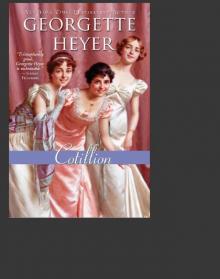 Cotillion
Cotillion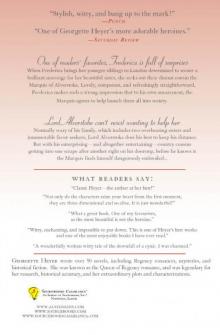 Frederica
Frederica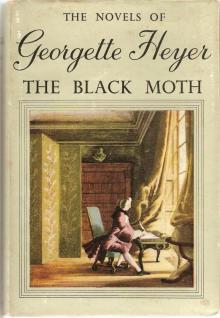 The Black Moth: A Romance of the XVIIIth Century
The Black Moth: A Romance of the XVIIIth Century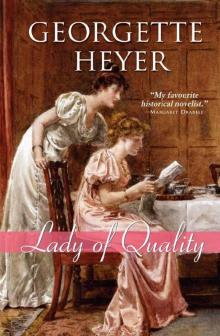 Lady of Quality
Lady of Quality Snowdrift and Other Stories
Snowdrift and Other Stories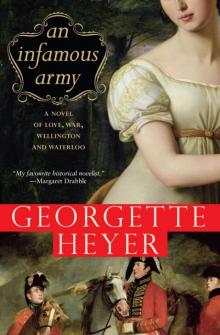 An Infamous Army
An Infamous Army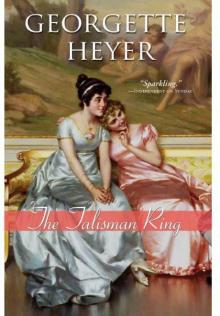 The Talisman Ring
The Talisman Ring Venetia
Venetia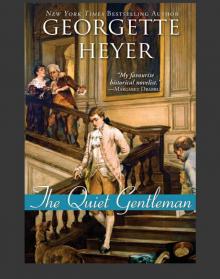 The Quiet Gentleman
The Quiet Gentleman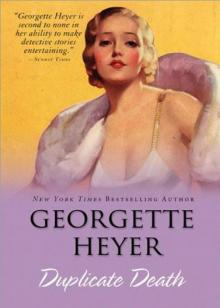 Duplicate Death
Duplicate Death Cousin Kate
Cousin Kate Black Sheep
Black Sheep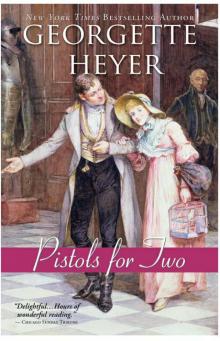 Pistols for Two
Pistols for Two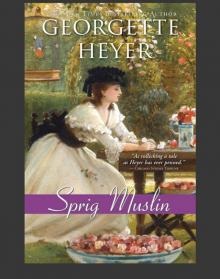 Sprig Muslin
Sprig Muslin No Wind of Blame
No Wind of Blame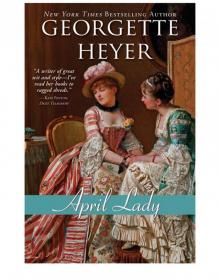 April Lady
April Lady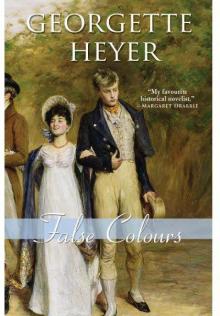 False Colours
False Colours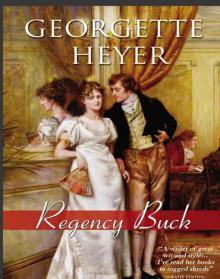 Regency Buck
Regency Buck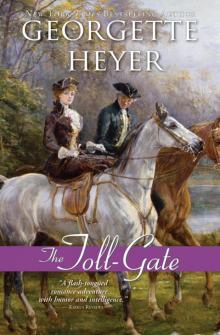 The Toll-Gate
The Toll-Gate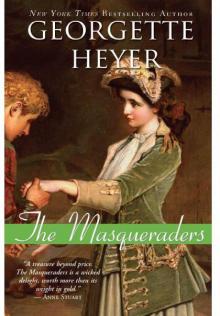 The Masqueraders
The Masqueraders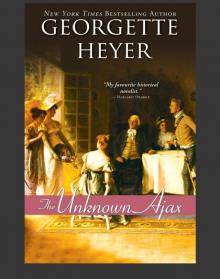 The Unknown Ajax
The Unknown Ajax The Grand Sophy
The Grand Sophy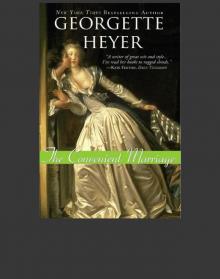 The Convenient Marriage
The Convenient Marriage Faro's Daughter
Faro's Daughter The Conqueror
The Conqueror The Foundling
The Foundling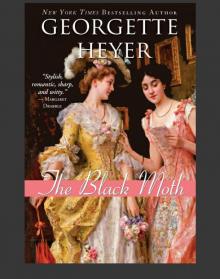 The Black Moth
The Black Moth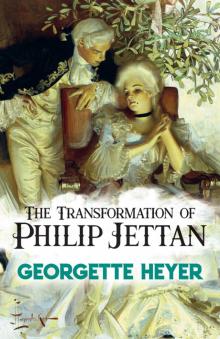 The Transformation of Philip Jettan
The Transformation of Philip Jettan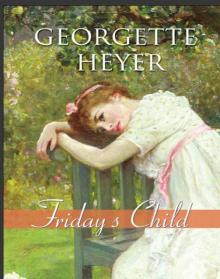 Friday's Child
Friday's Child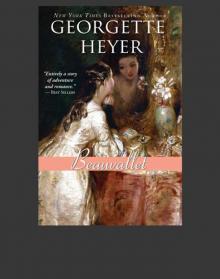 Beauvallet
Beauvallet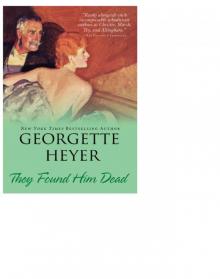 They Found Him Dead
They Found Him Dead Charity Girl
Charity Girl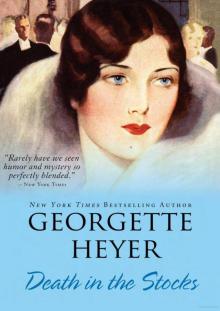 Death in the Stocks: Merely Murder
Death in the Stocks: Merely Murder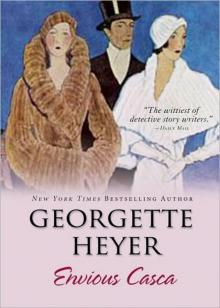 Envious Casca
Envious Casca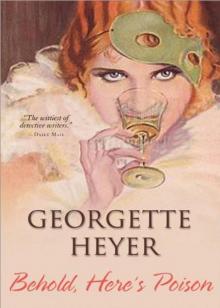 Behold, Here's Poison
Behold, Here's Poison Arabella
Arabella The Nonesuch
The Nonesuch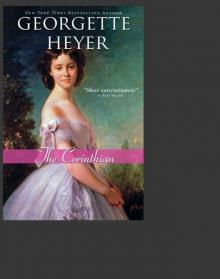 The Corinthian
The Corinthian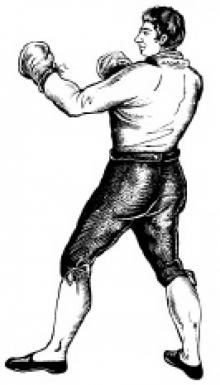 Jennifer Kloester
Jennifer Kloester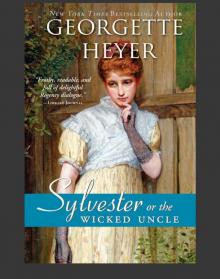 Sylvester
Sylvester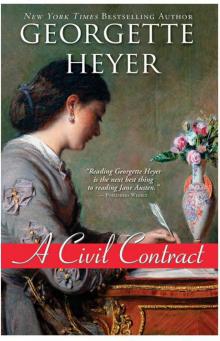 A Civil Contract
A Civil Contract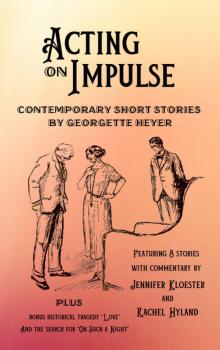 Acting on Impulse
Acting on Impulse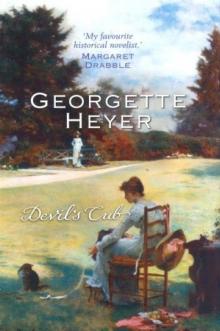 Devil’s Cub at-2
Devil’s Cub at-2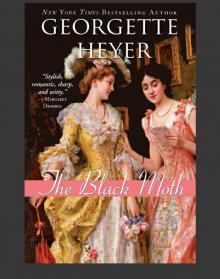 Black Moth
Black Moth Grand Sophy
Grand Sophy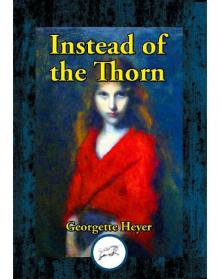 Instead of the Thorn
Instead of the Thorn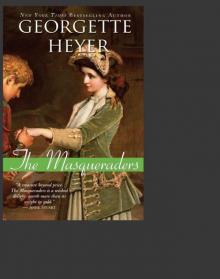 Masqueraders
Masqueraders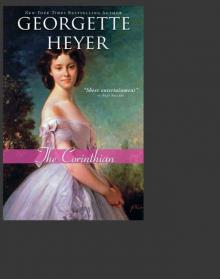 Corinthian
Corinthian Reluctant Widow
Reluctant Widow